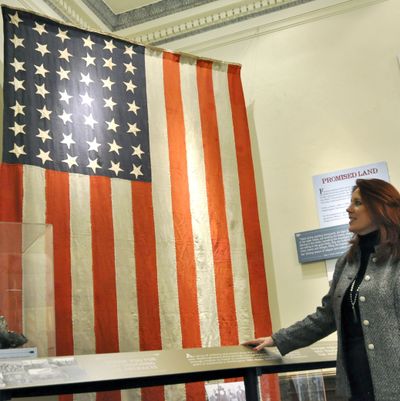Capitol exhibit marks 125 years of Washington statehood

OLYMPIA – 1889 was a momentous year for Washington.
Three of its largest cities, including Spokane Falls, nearly burned to the ground that summer and then began to rise from their ashes. A second railroad announced plans to join the Northern Pacific in connecting the state with the East. A constitutional convention set up the Populist-Progressive framework for government, which was ratified by the strictly male electorate in September. And 125 years ago today, the telegram arrived from the other Washington declaring the official switch from territory to statehood.
Collect. Western Union wouldn’t deliver it until the 61 cents was paid.
Photos from those fires, a bound copy of the Constitution and a reproduction of the telegram are part of the “Blazes, Rails and the Year of Statehood” exhibit that opens today at the Washington secretary of state’s office in the Capitol.
Originally conceived as a way to mark the 125th anniversary of statehood, it grew to encompass other events that year, Secretary of State Kim Wyman said. It’s a way of relating history through photos and stories to visitors, including the estimated 40,000 school-age children who come through the office on field trips each year.
“It focuses in on the people,” Wyman said. “I know when I was in school, I didn’t enjoy history that was just dates and facts.”
One exhibit focuses on the fires of that summer – June in Seattle, July in Ellensburg and August in what was then Spokane Falls – that were turning points for frontier towns built principally out of lumber becoming commercial centers out of stone and brick. Another explains the competition to become the state capital, which had so many cities vying for the honor that it required a vote that year to trim down the list and another in 1890 to select Olympia over North Yakima and Ellensburg.
Another panel recounts suffragist Zerelda McCoy’s unsuccessful push to hold off on statehood until women had the right to vote. That feature includes a bit of a mystery because although McCoy was a renowned women’s rights advocate in her day, historians couldn’t find a photo of her. She appears as a silhouette on the wall, and Wyman said she hopes someone will come forward with a photo to fill in the space.
This is the sixth multimedia historical project the office has mounted with the help of local and state historical societies and financial support from private and corporate donors. This one has Spokane-based Avista as a major corporate donor.
It also has some items on loan from private collectors, including a large 42-star American flag from former state Sen. Stuart Halsan, a historical collector who found the rare flag at an auction and had it carefully restored.
There were relatively few 42-star flags made. The nation started 1889 with 38 states, added North and South Dakota on Nov. 2, Montana on Nov. 8 and Washington three days later. On July 3, 1890, Idaho joined the union, too, so the flags went to 43 stars.
“There may be as few as five or six left,” Wyman said.
For today’s opening, the exhibit will feature a true one-of-a-kind item, the original bound copy of the state constitution. It will be escorted to the Capitol from the State Archives by the State Patrol in the morning and escorted back in the evening. The copy on display through August is so good that most people won’t be able to tell the difference, Wyman said.